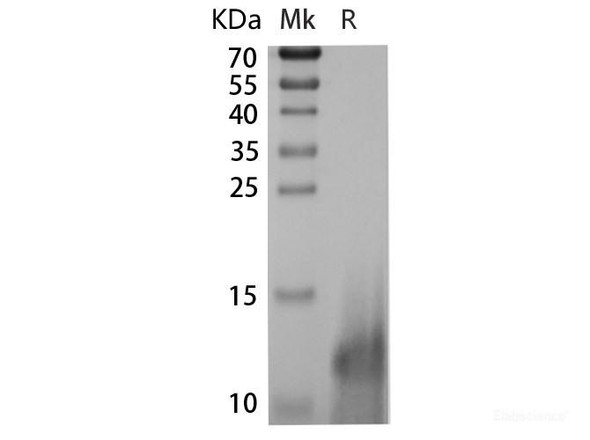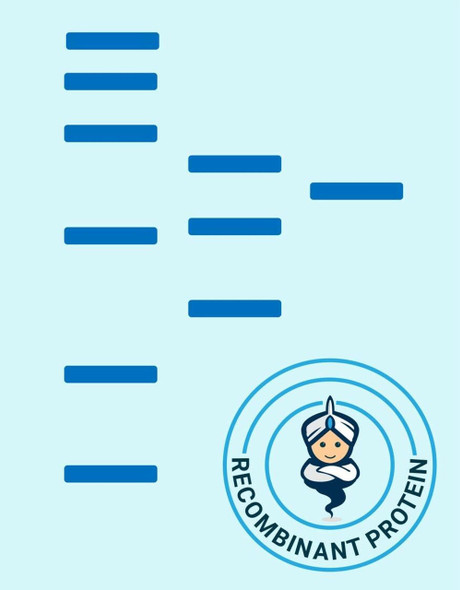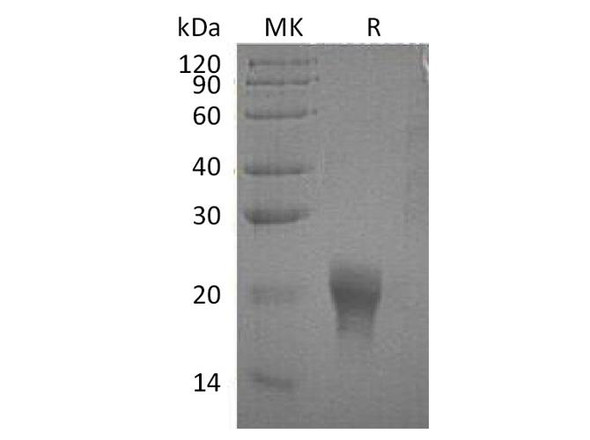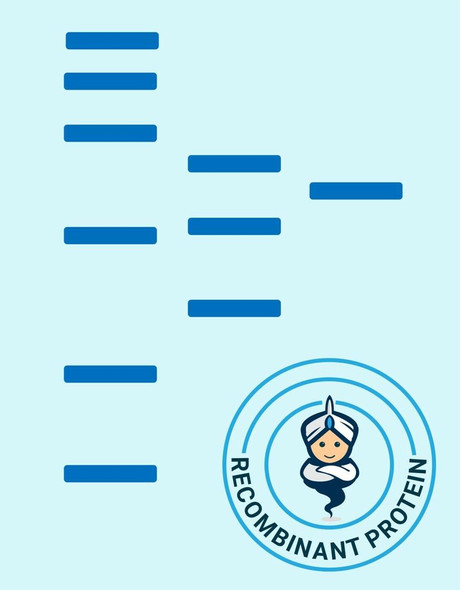Description
| Product Name: | Human IL 5 Recombinant Protein |
| Product Code: | RPPB0515 |
| Size: | 10µg |
| Species: | Human |
| Target: | IL 5 |
| Synonyms: | EDF, BCDFII, TRF, T-cell replacing factor, Eosinophil differentiation factor, B cell differentiation factor I, IL-5. |
| Source: | Escherichia Coli |
| Physical Appearance: | Sterile Filtered White lyophilized (freeze-dried) powder. |
| Formulation: | Lyophilized from a concentrated (1mg/ml) solution in water containing no additives. |
| Solubility: | It is recommended to reconstitute the lyophilized Interleikin-5 in sterile 18M?-cm H2O not less than 100�g/ml, which can then be further diluted to other aqueous solutions. |
| Stability: | Lyophilized Interleukin-5 although stable at room temperature for 3 weeks, should be stored desiccated below -18°C. Upon reconstitution IL5 should be stored at 4°C between 2-7 days and for future use below -18°C.Please avoid freeze thaw cycles. |
| Purity: | Greater than 98.0% as determined by:(a) Analysis by RP-HPLC.(b) Analysis by SDS-PAGE. |
| Amino Acid Sequence: | The sequence of the first five N-terminal amino acids was determined and was found to be Met-Ile-Pro-Thr-Glu |
| Biological Activity: | The ED50 as determined by the dose-dependant stimulation of the proliferation of TF-1 cells was found to be < 0.15ng/ml, corresponding to a Specific Activity of 6 x 106 IU/mg. |
The protein encoded by this gene is a cytokine that acts as a growth and differentiation factor for both B cells and eosinophils. This cytokine is a main regulator of eosinopoiesis, eosinophil maturation and activation. The elevated production of this cytokine is reported to be related to asthma or hypereosinophilic syndromes. The receptor of this cytokine is a heterodimer, whose beta subunit is shared with the receptors for interleukine 3 (IL3) and colony stimulating factor 2 (CSF2/GM-CSF). This gene, together with those for interleukin 4 (IL4), interleukin 13 (IL13), and CSF2, form a cytokine gene cluster on chromosome 5. This cytokine, IL4, and IL13 are found to be regulated coordinately by long-range regulatory elements spread over 120 kilobases on chromosome 5q31.
Interleukin-5 Human Recombinant produced in E.Coli is a dimeric, non-glycosylated polypeptide chain containing two 113 amino acids chains, and having a molecular mass of 26522.84 Dalton. The IL-5 is purified by proprietary chromatographic techniques.
| UniProt Protein Function: | IL5: Factor that induces terminal differentiation of late- developing B-cells to immunoglobulin secreting cells. Belongs to the IL-5 family. |
| UniProt Protein Details: | Protein type:Secreted; Secreted, signal peptide; Cytokine Chromosomal Location of Human Ortholog: 5q31.1 Cellular Component: extracellular region; extracellular space; intracellular Molecular Function:cytokine activity; growth factor activity; interleukin-5 receptor binding; protein binding Biological Process: activation of MAPKK activity; axon guidance; cytokine and chemokine mediated signaling pathway; epidermal growth factor receptor signaling pathway; fibroblast growth factor receptor signaling pathway; inflammatory response; innate immune response; insulin receptor signaling pathway; MAPKKK cascade; nerve growth factor receptor signaling pathway; positive regulation of B cell proliferation; positive regulation of eosinophil differentiation; positive regulation of immunoglobulin secretion; positive regulation of JAK-STAT cascade; positive regulation of peptidyl-tyrosine phosphorylation; positive regulation of transcription factor activity; Ras protein signal transduction; small GTPase mediated signal transduction; vascular endothelial growth factor receptor signaling pathway |
| NCBI Summary: | This gene encodes a cytokine that acts as a growth and differentiation factor for both B cells and eosinophils. The encoded cytokine plays a major role in the regulation of eosinophil formation, maturation, recruitment and survival. The increased production of this cytokine may be related to pathogenesis of eosinophil-dependent inflammatory diseases. This cytokine functions by binding to its receptor, which is a heterodimer, whose beta subunit is shared with the receptors for interleukine 3 (IL3) and colony stimulating factor 2 (CSF2/GM-CSF). This gene is located on chromosome 5 within a cytokine gene cluster which includes interleukin 4 (IL4), interleukin 13 (IL13), and CSF2 . This gene, IL4, and IL13 may be regulated coordinately by long-range regulatory elements spread over 120 kilobases on chromosome 5q31. [provided by RefSeq, Jul 2013] |
| UniProt Code: | P05113 |
| NCBI GenInfo Identifier: | 124341 |
| NCBI Gene ID: | 3567 |
| NCBI Accession: | P05113.1 |
| UniProt Secondary Accession: | P05113,Q13840, |
| UniProt Related Accession: | P05113 |
| Molecular Weight: | 15,238 Da |
| NCBI Full Name: | Interleukin-5 |
| NCBI Synonym Full Names: | interleukin 5 |
| NCBI Official Symbol: | IL5�� |
| NCBI Official Synonym Symbols: | EDF; TRF; IL-5�� |
| NCBI Protein Information: | interleukin-5 |
| UniProt Protein Name: | Interleukin-5 |
| UniProt Synonym Protein Names: | B-cell differentiation factor I; Eosinophil differentiation factor; T-cell replacing factor; TRF |
| Protein Family: | Interleukin |
| UniProt Gene Name: | IL5�� |
| UniProt Entry Name: | IL5_HUMAN |










